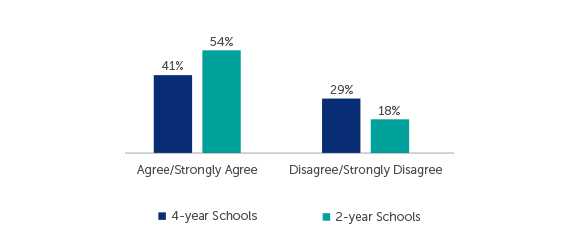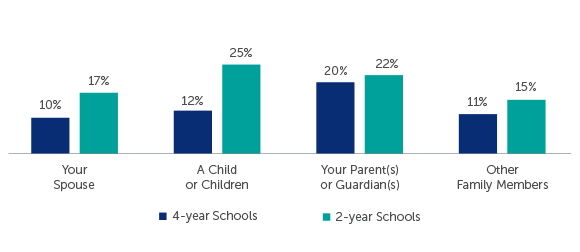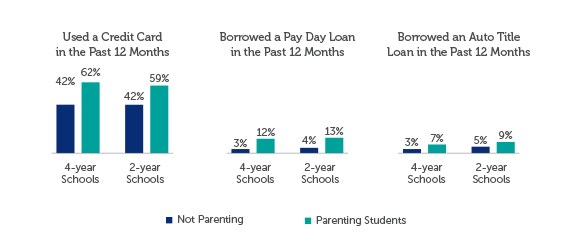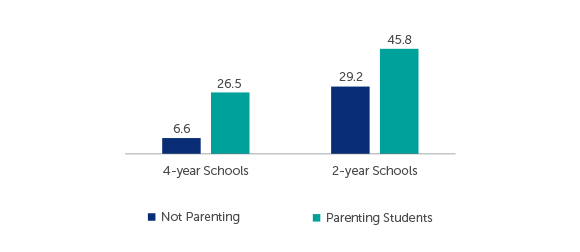
Students at two-year institutions were more likely to report that it is important that they support their family financially while in college, compared to students at four-year institutions. (Q60)
- More than half of two-year respondents agreed or strongly agreed it is important they support their family, compared to 41 percent of respondents at four-year institutions.
- A quarter of two-year respondents provide financial support for a child or children while in school, compared to 12 percent of four-year respondents.
Respondents who provided financial support for children tended to experience more hardships compared to those who were not financially supporting children. Higher percentages of parenting students:
- Experienced low or very low food security, housing insecurity, and homelessness in the prior 12 months,
- Were first-generation students,
- Reported their family’s finances were worse since the coronavirus outbreak, and
- Reported receiving food assistance, unemployment assistance, housing assistance, utility assistance, and medical assistance in the prior 12 months.
Parenting students feel connected to, and appreciative of, their institution.
- On average, parenting students had much higher net promoter scores, in both two-year and four-year institutions, than students who were not financially supporting children. The higher the net promoter score, the more likely the student is to recommend their institution to a friend or family member.
Q60: It is important that I support my family financially while in college.*

*Responses indicating ‘Neutral’ are not shown</span)
Q47-50: Do you provide financial support for any of the following individuals? Respondents who answered ‘Yes’

Used a Credit Card in the Past 12 Months
Borrowed a Pay Day Loan in the Past 12 Months
Borrowed an Auto Title Loan in the Past 12 Months

Net Promoter Score

Students who support other family members while they are in college need special considerations.
Problem:
Students who support family members while they are in college may have narrower windows of time to interact with colleges, may lack aid packages that are sensitive to the true costs they encounter, and may become offended by the unformed assumptions they feel from staff and faculty.
Solution:
Train faculty, staff, and on-campus mental health providers on the unique experiences of student caregivers. Institutions can educate faculty and staff on the realities and stressors faced by parenting students during college (financial insecurity, basic needs insecurity, dependent care, etc.) to foster a culture of empathy and caring for these, and all, students. Having mental health professionals, social workers, and other staff trained and knowledgeable in trauma-informed care is also essential.51
Solution:
Ensure parents have affordable, reliable access to childcare (on- or off-campus). At Monroe Community College in upstate New York, students with dependent children who used on-campus childcare were nearly three times more likely to graduate than student parents who did not use the center.52 Pre-pandemic, some institutions found success with a co-op model, where parenting students (who cannot afford the associated costs) work in the childcare center a certain number of hours a week for a discount on fees. Institutions can also assist students in locating and applying for local, state, federal, and private resources to pay for childcare.
